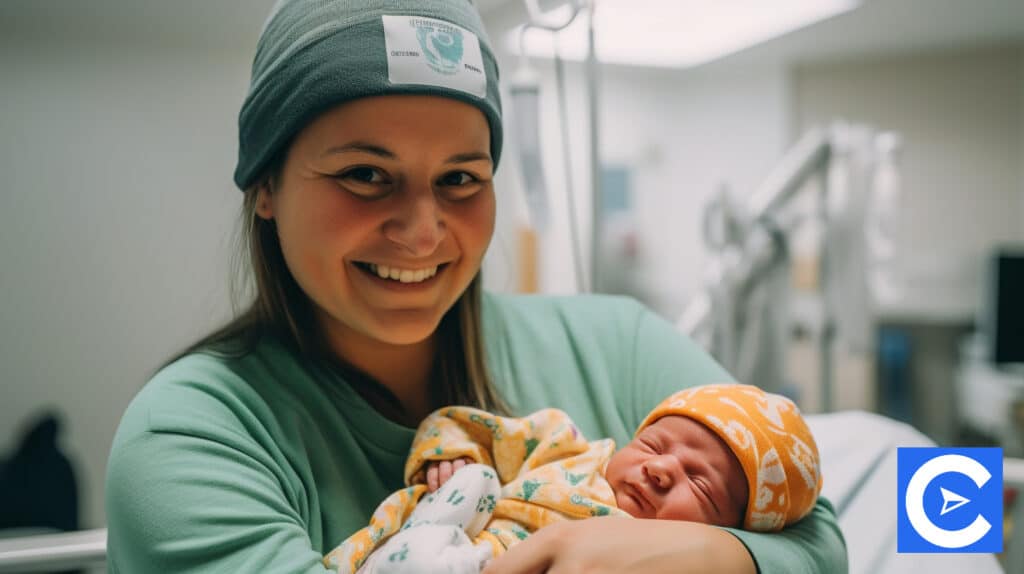Salutations! Welcome to the ultimate guide on Pediatric Nurse Certification.
Reading this guide will give you all the information you need on the steps to secure Pediatric Nurse Certification.
In this article, the team from Nurse Code touches on the following steps:
- Understanding the profession
- Getting a Nursing Degree
- Earning Nursing Experience
- Taking the NCLEX-RN exam
- CPN Certification Requirements and Exam
Introduction

Nursing is more than an occupation; it is a calling for those looking to pursue being this type of Clinical Nurse Specialist.
Being a Pediatric Specialist calls for a kind person who easily relates to children and makes them feel at ease.
Whenever a child needs critical care, parents aren’t the only individuals who play an essential part in their lives.
Pediatric Nurses have the particular knowledge and abilities to assist in caring for children from infancy through to when they become adolescents.
A Pediatric Nurse focuses on caring for and treating children of all ages, but responsibilities may vary depending on the Nurse’s department or specialty.
You are likely to encounter these Specialized Nurses in:
- Pediatric intensive care units (PICU): your day-to-day tasks involve caring for children who require more frequent or invasive monitoring, such as those with severe or life-threatening conditions
- Intermediate care facility: A Pediatric Nurse Practitioner is likely to encounter acutely ill children but needs more frequent monitoring – although the monitoring required is more than that provided in a general care unit, it is also less than that offered in a PICU
- Pediatric rehabilitation centers: Pediatric Nurses working in pediatric rehabilitation units offer combined rehab and nursing patient care
The aim is to prepare a child and their family for the child’s return home and reentry into everyday life with any remaining disability.
A professional working in the pediatric nursing department will experience a challenging yet rewarding career.
Although Pediatric Nurses’ primary skill and characteristic is a dedication to child health care, it’s also imperative to understand the skills and nursing education needed for this career.
Steps to Become a Certified Pediatric Nurse

Looking to become a Pediatric Nurse Practitioner? Your journey has been broken down into the following steps:
To work in the pediatric nursing department, you must possess the ability to connect with kids and their parents comfortably.
Persons who have a natural rapport with children and a desire to play an essential role in their well-being and healthy development should consider a career in pediatric nursing.
It offers gratification and meaningfulness in your career in the long run.
Understand the profession (specialty area) and check eligibility requirements

In a 2014 research by the Institute of Pediatric Nursing, 92 percent of Pediatric Nurses said they recommend others to join the profession because it’s fulfilling to make a difference in the lives of young ones.
So, where do Pediatric Nurses work?
The simple answer is wherever there are babies, kids, and teenagers.
If you have identified and settled on pediatric nursing as your calling in life, decide on earning the necessary credentials to become one.
After completing your pediatric nursing program and special training, you’ll be ready to grow your career in a city, suburban or rural environment, and various facilities.
These include:
- Free-standing children’s hospitals
- Children’s hospitals are associated with a major medical center
- Outpatient care facilities
- Community hospitals
- Major medical centers
- School setting
With the proper education and training in pediatric nursing, you’ll be able to work in various settings where your skill sets, knowledge, and experience are needed.
What will your workdays as a Pediatric Nurse be like?
Your day-to-day activities as a Pediatric Nurse will largely depend on the facility you are employed.
The job description can include:
- Develop Effective care plans for infants, toddlers, children, and teenagers in collaboration with Physicians, Nurses, and other healthcare professionals
- Calm and comfort parents who are worried about their children, and teach them how to care for their children effectively
- Establish a connection with your pediatric patients and communicate effectively with them to assist them in coping with their diseases, injuries, and treatments
- If you are hired as a School Nurse, your day-to-day activities will promote preventive healthcare for students, faculty, and community members
For Pediatric Nurses, the future appears bright. The BLS predicts a 9% growth in employment from 2020 to 2030 for Registered Nurses.
Get a Nursing degree
The starting point to a Pediatric Nurse career is becoming a Registered Nurse (RN) or Advanced Practice Registered Nurse (APRN).
To become one, you must enroll for either an associate’s degree or a bachelor’s degree in nursing (BSN).
A master’s of science degree (MSN) is also allowable.
The following are pathways that can help you earn a degree as a Registered Nurse:
- An Associate of Science degree in nursing (ASN)
- A degree in Bachelor of Science in Nursing (BSN)
- An LPN to Associate in Nursing degree
- An LPN to BSN program
- An online RN to BSN program
- An accelerated nursing program (BSN degree)
The duration taken to earn the degree and kick off a career as a Pediatric Nurse depends on factors such as current education level, potential transfer credits, etc.
Take the NCLEX-RN exam
It is a mandatory requirement for every prospective RN in the US to sit for and pass the National Council Licensing Examination (NCLEX-RN).
It’s a comprehensive exam open to students who have already completed a nursing program.
The test focuses on an RNs knowledge of four specific nursing topics.
It will cover:
- Safe and effective care environments
- Promotion and maintenance of health
- Psychosocial integrity and coping with the stress of a nursing profession
- Physiological integrity
Take the NCLEX-RN exam
Finishing a nursing program and passing the NCLEX-RN does not qualify you to work as a Registered Nurse.
Depending on your respective state, you must satisfy the licensing requirements stipulated by the Board of Nursing (BON).
After earning your license, you can start hunting for your first job as an RN.
If your dream is to work as a Pediatric Nurse, you should seek a position in a healthcare clinic or hospital that cares for children and younger patients.
Earn Experience
Before earning your accreditation to work as a Pediatric Nurse, you must prove prior experience providing children’s care.
So, you’ll need to work in a facility where you can practice your pediatric nursing specialty and gain experience caring for kids.
The Pediatric Nursing Certification Board (PNCB) is responsible for overseeing Pediatric Nurses.
They have stipulated primary pediatric clinical hours requirements for RNs seeking certification to work as Pediatric Nurses.
These include:
- No less than 1,800 hours of clinical experience in the pediatric nursing department in two years (24 months)
- At least five years’ experience as a Registered Nurse in pediatrics – in addition, they require 3,000 hours in pediatric nursing plus at least 1,000 hours within the past 24 months
CPN certification Requirements & Certified Pediatric Nurse, CPN exam

The Pediatric Nursing Certification Board (PNCB) leads in the certification of Pediatric Nurses.
In addition to the certification program, they strive for optimal outcomes in pediatric health.
They promote and uphold integrity, quality, innovation, advocacy, and respect for Registered Nurses committed to specializing in pediatrics.
Before you can obtain a license to work as a Pediatric Nurse, you must sit for an exam given by the central licensing body for pediatrics, the PNCB.
They offer a PNCB exam which consists of 175 multiple-choice questions, to be completed in three hours.
To qualify for the CPN exam, you must have at least 30 hours of continuing education (contact hours) in pediatric nursing within the last three years.
Additional requirements may include academic credits, preceptorship, presentations, publications, and professional service.
Those who pass the exam earn the PNCB’s credential referred to as the Certified Pediatric Nurse (CPN).
Start your Pediatric Nurse career

Working as a Pediatric Nurse requires additional skills and characteristics beyond a Registered Nurse’s.
Prospective Pediatric Nurses need compassion, empathy, and a high-level ability to handle emergencies calmly and professionally.
Conclusion

Pediatric Nursing can be a rewarding profession.
As a Pediatric Nurse, you will help shape the lives of future generations through comprehensive critical care, and certifications for Pediatric Nurses are part of that journey.
Therefore, attending CPN classes and meeting other requirements are necessary for the national certification exam.
A nurse’s competence, knowledge, and critical thinking skills are validated by certification.
FAQs

What is CPN in nursing?
Pediatric Nursing certification is a specialty certification for Registered Nurses in pediatrics. This certification acknowledges a superior level of knowledge and skill in this area of nursing practice. It indicates that you have specialty knowledge beyond RN licensure. Board certification is recognized by employers, colleagues, and patients and their families.
What qualifications do you need to be a Pediatric Nurse?
Pediatric RNs need to have an Associate’s Degree in Nursing (ADN) or a Bachelor’s of Science in Nursing (BSN). They must also earn the certified Pediatric Nurse certification to practice. The requirements for this certification include clinical practice in offering pediatric primary care and acute care to children.
How much does CPN cost?
Prospective Pediatric Nurses will pay $300 to sit for the CPN exam for the initial sitting. SPN members seated for the initial exam using the No Pass, No Pay will pay $255. Luckily PNCB allows for a retest. To be permitted for a retest, you must pay $245.
How long is CPN certification good for?
The PNCB has set several eligibility requirements for those looking to set and attain the title of CPN. Once you successfully sit for and pass the exam, you are awarded the Pediatric Nurse – Board Certified (RN-BC)Pediatric Nurse credential. This credential is valid for five years.
Who offers Pediatric Nursing Certifications?
Three leading organizations in the US offer Pediatric Nurse certification examinations. These include the Pediatric Nursing Certification Board (PCNB), American Nurses Credentialing Center (ANCC), and the National Certification Corporation (NCC). Each examination body has an exam. They have stipulated requirements for recertification and eligibility criteria to qualify for the exam.
What is the CPN exam like?
The CPN exam consists of 175 questions that candidates should answer within 3 hours. The candidates are expected to describe their knowledge and competency in pediatric nursing. The exam is similar to the NCLEX in that the questions are multiple-choice ones.
What is a Certified Pediatric Nurse?
A Certified Pediatric Nurse is a competent and licensed RN who has expertise in pediatric care. While they may work in different settings, the work of a CPN involves assessing patients, evaluations, and facilitating short/ long-term care. The PNCB licenses a CPN.









